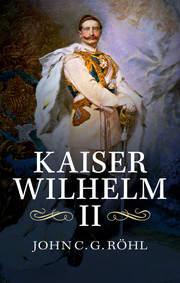Book contents
- Frontmatter
- Dedication
- Contents
- List of figures
- Acknowledgements
- Preface to the English edition
- Preface to the German edition
- Acknowledgements
- Overview: Wilhelm the Last, a German trauma
- Part I 1859–1888: The Tormented Prussian Prince
- Part II 1888–1909: The Anachronistic Autocrat
- Part III 1896–1908: The Egregious Expansionist
- Part IV 1906–1909: The Scandal-Ridden Sovereign
- 14 The Eulenburg affair (1906–1909)
- 15 Bülow’s betrayal of the Kaiser: the Daily Telegraph crisis (1908–1909)
- 16 From Bülow to Bethmann Hollweg: the Chancellor merry-go-round (1909)
- Part V 1908–1914: The Bellicose Supreme War Lord
- Part VI 1914–1918: The Champion of God’s Germanic Cause
- Part VII 1918–1941: The Vengeful Exile
- Notes
- Index
14 - The Eulenburg affair (1906–1909)
Published online by Cambridge University Press: 05 September 2014
- Frontmatter
- Dedication
- Contents
- List of figures
- Acknowledgements
- Preface to the English edition
- Preface to the German edition
- Acknowledgements
- Overview: Wilhelm the Last, a German trauma
- Part I 1859–1888: The Tormented Prussian Prince
- Part II 1888–1909: The Anachronistic Autocrat
- Part III 1896–1908: The Egregious Expansionist
- Part IV 1906–1909: The Scandal-Ridden Sovereign
- 14 The Eulenburg affair (1906–1909)
- 15 Bülow’s betrayal of the Kaiser: the Daily Telegraph crisis (1908–1909)
- 16 From Bülow to Bethmann Hollweg: the Chancellor merry-go-round (1909)
- Part V 1908–1914: The Bellicose Supreme War Lord
- Part VI 1914–1918: The Champion of God’s Germanic Cause
- Part VII 1918–1941: The Vengeful Exile
- Notes
- Index
Summary
Shortly before his dismissal Prince Bismarck had had to confront the truth of a fundamental flaw in the structure the Reich he had created: that a monarch without the protection of ministerial clothing was in danger of being exposed to merciless public scrutiny and criticism. Never was that danger greater than in the system of personal monarchy as practised by Wilhelm II under Bülow’s chancellorship. The conflict between the Kaiser’s anachronistic notions of divine right and the byzantine attitudes this engendered in the statesmen and the military, on the one hand, and the highly literate mass culture of Germany’s burgeoning cities on the other was, by the turn of the century, producing an unstable compound that needed only a spark for it to explode and rock the monarchy to its foundations. The frustration and humiliation increasingly felt by all segments of society at the obvious setbacks in the country’s foreign standing since Bismarck’s fall were well expressed in the letter the great sociologist Max Weber wrote in December 1906 to the liberal parliamentarian Friedrich Naumann:
The amount of contempt which we as a nation receive abroad (Italy, America, everywhere!) – rightly, that is the crucial thing – because we ‘put up with’ this rule by this man, really has now become a factor of first-rate ‘world political’ importance for us. […] We are becoming ‘isolated’ because this man rules us in this way and we tolerate and find excuses for it.
From late 1906 the widely felt bitterness with Wilhelm’s personal rule discharged itself in a long series of court scandals at the centre of which stood the Kaiser’s best friend, Philipp Eulenburg, and the so-called Liebenberg round table.
- Type
- Chapter
- Information
- Kaiser Wilhelm IIA Concise Life, pp. 103 - 109Publisher: Cambridge University PressPrint publication year: 2014



